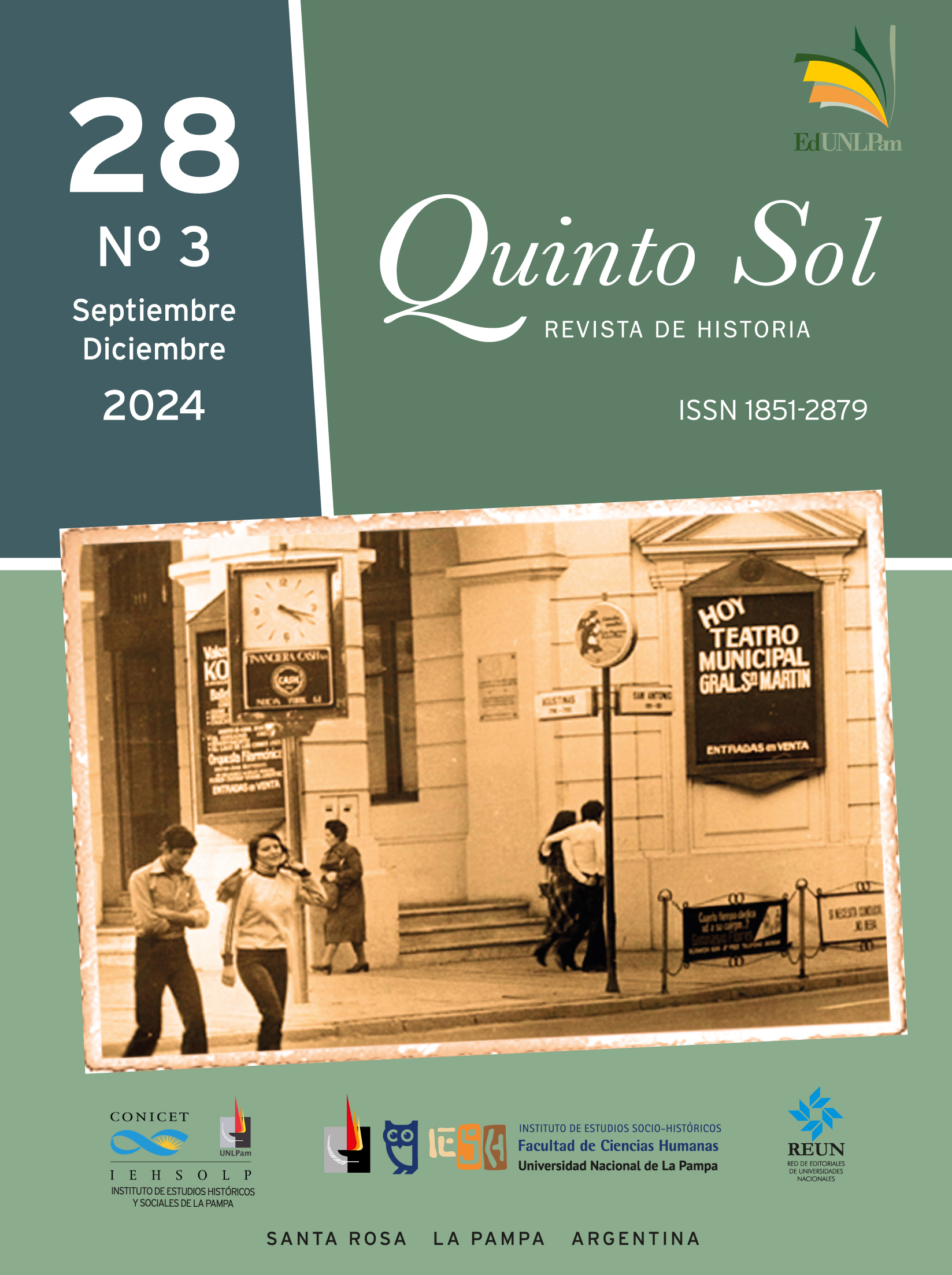Beyond lies: social communication plans and psychological action during the Malvinas war
DOI:
https://doi.org/10.19137/qs.v28i3.8262Keywords:
war , propaganda, communication strategies, armed forcesAbstract
Recent historiographical research has posed the question about the “productive dimension of power” and the construction of consensus among the population during the last Argentine civic-military dictatorship (1976-1983). This article extends that question to the Malvinas war, fought between Argentina and Great Britain in 1982. Based on the study of documents declassified in 2015 and kept in the Department of Naval Historical Studies, the article analyzes the social communication and the psychological campaign that the Argentine Navy projected during those days to model celebratory attitudes and feelings towards the Army and to underpin the military operations of the dictatorship in the South Atlantic, and the consequently expected (and frustrated) diplomatic negotiations.
Downloads
References
Agostini, V. y Lettieri, L. (2020). Archivos y narrativas. Una mirada sobre Malvinas desde los documentos de la Armada Argentina. Revista Sudamérica, 12, 393-413.
Águila, G. (2008). Dictadura, represión y sociedad en Rosario, 1976/1983. Un estudio sobre la represión y los comportamientos y actitudes sociales en dictadura. Prometeo.
Águila, G. (2014). Disciplinamiento, control social y ‘acción sicológica’ en la dictadura argentina. Una mirada a escala local: Rosario, 1976-1981. Revista Binacional Brasil Argentina, 3(1), 231-239.
Amarilla, F. y Jalil, N. (2017). Malvinas: Una mirada desde los Archivos de las FFAA. Jornadas sobre la Cuestión Malvinas: Investigaciones y Debates a 35 Años de la Guerra. La Plata, 10 de noviembre, pp. 1-20. http://www.memoria.fahce.unlp.edu.ar/trab_eventos/ev.10472/ev.10472.pdf
Barragán, I. e Iturralde, M. (2019). La estructura represiva de la Armada Argentina desde una perspectiva regional. Apuntes y consideraciones sobre la Fuerza de Tareas 6 durante la última dictadura militar en Argentina. Historia Regional, 41, 1-13.
Buch, E. y Juárez, C. (2022). Los conciertos para el Fondo Patriótico y la música en la cultura de guerra. En E. Buch y A. Gilbert (Comps.) Escuchar Malvinas (pp. 57-92). Gourmet Musical.
Canelo, P. (2015). La importancia del nivel municipal para la última dictadura militar argentina. Un estudio a través de sus documentos reservados y secretos (1976-1983). Historia, II(48), 405-434.
Guber, R. (2020). Una guerra implausible. Las ciencias sociales, las humanidades y el lado moralmente probo en los estudios de Malvinas. PolHis, 1-31. https://historiapolitica.com/datos/biblioteca/malvinas_guber2.pdf
Lorenz, F. (2013). Unas islas demasiado famosas. Malvinas, historia y política. Capital Intelectual.
Lvovich, D. (2006). Dictadura y consenso. ¿Qué podemos saber?. Puentes, (17), 1-5.
Lvovich, D. (2008). Micropolítica de la dictadura: Poder municipal y asociacionismo local, entre la aceptación y el distanciamiento. En G. Soprano y E. Bohoslavsky (Comps.) Un Estado con rostro humano. Funcionarios e instituciones estatales en Argentina (desde 1880 a la actualidad) (pp. 411-430). Universidad Nacional de General Sarmiento.
Martínez Llamas, D. (2017). «Indisciplinados»: conflictos con los milicianos catalanes durante las invasiones inglesas (1806-1807). En M. Galí Boadella, C. Zaidenwerg, M. Lucci, G. Dalla-Corte Caballero (Eds.) Cataluña e Iberoamérica. Investigaciones recientes y nuevos enfoques (pp. 113-126). Asociación de Catalanista de América Latina.
Picco, E. (2020). Soñar con las Islas. Una crónica de Malvinas más allá de la guerra. Prohistoria.
Poli, J. H. (1958). Acción psicológica, arma de paz y de guerra. Círculo Militar.
Poli, J. H. (1979). Estrategia Psicosocial. Círculo Militar.
Poli, J. H. (1982). Planeamiento y desarrollo del factor psicosocial en los conflictos bélicos localizados modernos. Revista de la Escuela Superior de Guerra, LX(460), 45-60.
Pontoriero, E. (2021). La Armada argentina y su enfoque para la “guerra contra la subversión” en los comienzos del terrorismo de Estado (1973-1976). Revista Austral de Ciencias Sociales, (40), 239-255. https://doi.org/10.4206/rev.austral.cienc.soc.2021.n40-13
Risler, J. (2018). La acción psicológica: dictadura, inteligencia y gobierno de las emociones (1955-1981). Tinta Limón.
Risler, J. y Schenquer, L. (2019). Guerra, diplomacia y producción de consenso: el plan de acción psicológica del Ejército argentino en el marco del conflicto con Chile por el Canal de Beagle (1981-1982). Revista Universitaria de Historia Militar, 8(17), 48-70.
Rodríguez, A. B. (2022). Inteligencia y “acción psicológica” en la guerra de Malvinas. La mirada de la Dirección de Inteligencia de la Policía de la Provincia de Buenos Aires sobre las actitudes sociales frente al conflicto. Anuario, (36), 1-32.
Simonoff, A. (2017). Construyendo la negociación hacia Malvinas: La sanción de la Resolución 2065 y su significado histórico. En N. Consani, F. M. Gómez y L. E. Sánchez (Comps.) Malvinas y la construcción de un reclamo soberano: pasado, presente y futuro (pp. 258-269). Universidad Nacional de La Plata. https://www.memoria.fahce.unlp.edu.ar/libros/pm.1159/pm.1159.pdf
Tessey, H. D. (2020). El Informe Rattenbach: ¿qué, cómo y para qué? Revista Defensa Nacional, (4), 281-314.
Downloads
Published
Issue
Section
License
Copyright (c) 2024 Quinto Sol

This work is licensed under a Creative Commons Attribution-NonCommercial-ShareAlike 4.0 International License.
When submitting their contributions, authors must declare that they have the permission of the file or repository where the documents that are attached to the work were obtained, whatever their format (unpublished manuscripts, images, audiovisual files, etc.). Such permission authorizes their publication and reproduction, releasing the journal and its editors from any liability or claim from third parties.
Likewise, authors must adhere to the Creative Commons license called "Attribution - Non-Commercial CC BY-NC-SA", through which the author allows copying, reproducing, distributing, publicly communicating the work and generating derivative works, as long as the original author is properly quoted and acknowledged. It is not allowed, however, to use the work for commercial purposes. Authors may establish additional agreements for the non-exclusive distribution of the version of the paper published in the journal (for example, placing it in an institutional repository or publishing it in a book), with the acknowledgment of having been published first in this journal.
The publication of content in this journal does not imply any royalty or charge for taxpayers.
Quinto Sol adheres to the DORA (Declaration on Research Assessment) signed in San Francisco, California, on December 16, 2012, and to the Declaration of Mexico (Joint Declaration LATINDEX - REDALYC - CLACSO - IBICT).










4.png)
2.png)












_(2).png)


1.jpg)



1.jpg)





